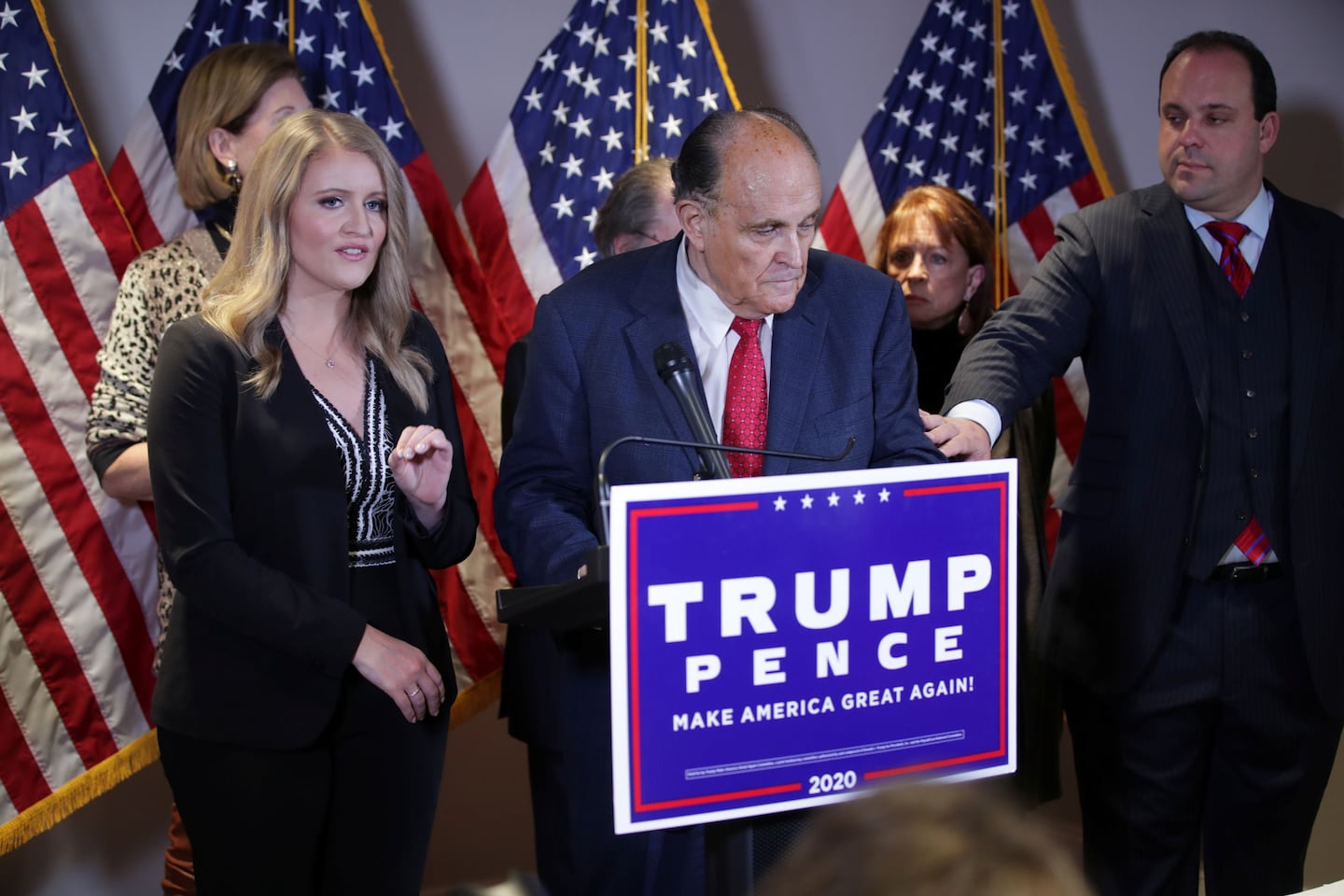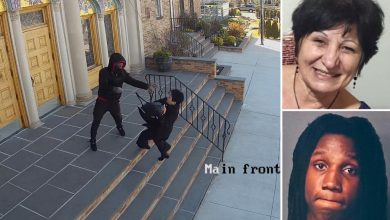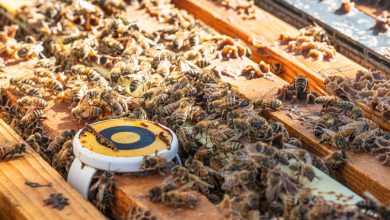Meadows, Giuliani and other Trump allies indicted in 2020 Arizona election investigation

Among those charged are former Trump White House Chief of Staff Mark Meadows attorneys Rudy Giuliani, Jenna Ellis, John Eastman and Christina Bobb, top campaign adviser Boris Epshteyn and former campaign aide Mike Roman. They are accused of allegedly contributing to an unsuccessful strategy to award the state’s electoral votes to Trump instead of Biden after the 2020 election. Also charged are Republicans who signed documents on December 14, 2020, falsely claiming that Trump was the rightful winner , including former state party chair Kelli Ward, state senators Jake Hoffman and Anthony Kern, and Tyler Bowyer, GOP national committeeman and operating director of Turning Point Action, the campaign arm of the conservative pro-Trump group Turning Point USA.
Trump has not been charged, but he is described in the indictment as an unindicted co-conspirator.
The indictments cap a yearlong investigation by Arizona Attorney General Kris Mayes (D) into how election strategy played out in Arizona, which Biden won by 10,457 votes . Arizona is the fourth state after Michigan, Georgia and Nevada to file charges against those who formed an alternate slate of presidential electors. As these cases move slowly through the court system, Trump is running for president again, and officials in Arizona and other battleground states are preparing for another likely contentious election.
In releasing the indictment, Mayes’ office redacted the names of all people outside of Arizona who were charged until they received their indictment. The Washington Post was able to identify them all through accounts of their alleged actions outlined in the indictment.
Many of those involved in the 2020 election strategy, which played out in Arizona and six other states, have long insisted that the tactic was legal because Trump voters were just placeholders to be activated if legal challenges to Biden’s victory end up in court. But Mayes accuses Trump’s allies inside and outside of Arizona of always intending to use voters to falsely claim that the election result was in doubt – thereby facilitating efforts to obstruct the certification of Biden’s victory in Congress on January 6, 2021.
Unlike investigations by prosecutors in Michigan and Nevada, Mayes took a top-down approach to his investigation. Similar to Atlanta-area prosecutors, Mayes was aimed not only at local conservatives who implemented the plan in Phoenix, but also at brokers outside of Trump’s orbit who allegedly helped put it into place. But unlike in Georgia, Mayes did not attempt to indict the former president.
This is a second set of accusations for Meadows, Giuliani, Ellis, Eastman and Roman, all of whom were indicted alongside Trump in Georgia last year. Ellis pleaded guilty in October to illegal conspiracy to overturn Trump’s 2020 election defeat in Georgia and has cooperated with prosecutors. This is the first time Epshteyn — now a top aide to the 2024 campaign who speaks frequently with the former president — has been charged for his alleged actions after the 2020 election.
Until late last year, Mayes’ case focused exclusively on local conservatives. SO, Arizona prosecutors and investigators met in December with Kenneth Chesebro, a lawyer and election strategy architect who pleaded guilty in Georgia in October to a single count of participating in a conspiracy to file false documents. Chesebro provided Mayes’ team with files — some of which were previously unpublished — that revealed more information about those involved in the Arizona effort, according to two people familiar with the investigation who requested anonymity to speak sensitive conversations. After that, they said the investigation in Arizona expanded.
Much of the activity Mayes investigated occurred in the weeks after Biden was declared the winner in Arizona and on Dec. 14, 2020, when Republican electors gathered to sign documents. Emails, recordings, text messages and other documents from that time have emerged in a variety of ways, including from the U.S. House of Representatives select committee that investigated the Jan. 6 attack 2021 against the US Capitol.
After the elections, Giuliani and Ellis traveled together frequently as they worked to overturn Trump’s loss state by state. Both attended a Nov. 30, 2020, event in downtown Phoenix attended by the state’s Republican and federal lawmakers, where they falsely claimed widespread fraud spoiled the election. Then Giuliani, Ellis and other Trump allies tried to convince Russell “Rusty” Bowers (R), then the speaker of the Arizona House of Representatives, to help. reverse the results.
Bowers, speaking in 2022 before the House committee, declared that it recalls Giuliani saying at that meeting: “We have a lot of theories – we just don’t have the evidence. »
Bobb, who has ties to Arizona, communicated with Trump allies about the strategy. After the House speaker met with Giuliani and other Trump allies, Bobb emailed the then-Senate president with information that Giuliani said could be used to sow doubt about the results of 2020.
Eastman, a pro-Trump lawyer who helped craft the multistate strategy, explained how to accomplish this.
Roman, the campaign staffer who oversaw Election Day operations, circulated emails about the alternative elector plan, tracked voter participation in several states and communicated to ensure the documents were in Washington before January 6, 2021, when Congress met to count the votes of the electoral college. Roman ordered Chesebro to ensure Ward, the state party chairman, had the necessary documents to prepare for signing the official-looking documents, according to publicly released emails.
In early December 2020, Epshteyn emailed a Wisconsin-based attorney who was helping the campaign and asked him to draft sample language for alternate electors in seven states, including Arizona. Epshteyn wrote that the request came from Giuliani, and he added: “If this is difficult, we can ask lawyers in these states to do it. »
Meadows, as Trump’s last White House chief of staff, has sought to downplay his involvement in the election plan. At a federal court hearing last August in Georgia, Meadows repeatedly testified under oath that he played no role in the election effort. Prosecutors presented as evidence December 2020 emails between Meadows and Jason Miller, a longtime Trump campaign aide, that showed Meadows sending a note about the plan to Miller.
“Let’s discuss this tomorrow,” Meadows wrote. When Miller told him the campaign was already talking about it, Meadows responded, “We just need to have someone coordinating state electors.” » In court, Meadows sought to downplay the significance of the email, saying his use of the term “we” meant the campaign, not him. Meadows also said he didn’t want to be “yelled at” by Trump.
On December 12, 2020, Arizona Republicans finalized plans to rally in Phoenix to express solidarity with Trump. Ward emailed Chesebro, Roman and others to inform him that the Trump campaign had requested participation from Arizona voters. “We are all ready to meet on December 14,” she wrote. “It would be optimal for the campaign to create and produce the materials in the REAL format needed so that staff can print the materials, voters can show up, meet/vote and sign, and then staff can gather the materials and send to the appropriate office. places in the appropriate manner.
Roman responded to the group and ordered Chesebro: “Please send the full updated AZ package. »
Ward also clarified in her email that she had spoken to Giuliani. She wrote that she “told him we were working to make sure we accomplish what we need to do.”
On December 14, 2020, the day of the official Electoral College meeting, Ward and other pro-Trump Republicans gathered at the state party headquarters. The party publicized the event – which it called “Signature– on Twitter, and voters posed for photos.
In the weeks since the Jan. 6 attack, prosecutors across the country have considered whether to investigate pro-Trump voters in their states. At the time, in Arizona, Mark Brnovich (right), then attorney general, chose not to do so. After Mayes won her election in 2022 — thanks in part to a promise to investigate election strategy — she assigned a team of prosecutors to begin searching for evidence.
Along the way, state prosecutors spent several hours questioning Bowers, Republican members of the Maricopa County Board of Supervisors who voted in favor of the authorization. Phoenix-area election results and others familiar with how the election maneuvering played out within the state GOP.
By early March, the investigation was winding down and pro-Trump voters received subpoenas asking them to testify before a grand jury. Many were advised to invoke their Fifth Amendment right not to answer questions.
Holly Bailey in Atlanta, Amy Gardner in Portland, Oregon, and Josh Dawsey and Maegan Vazquez in Washington contributed to this report.
washingtonpost





